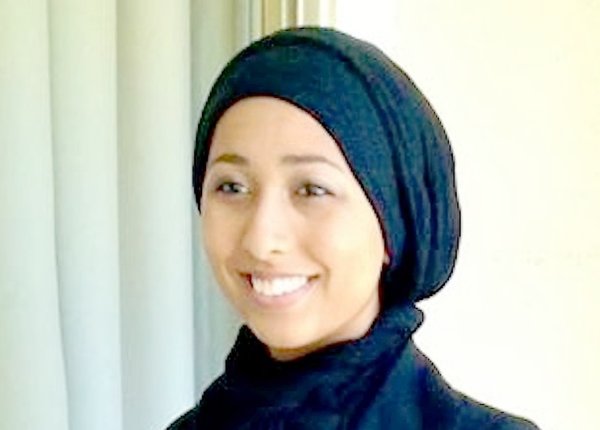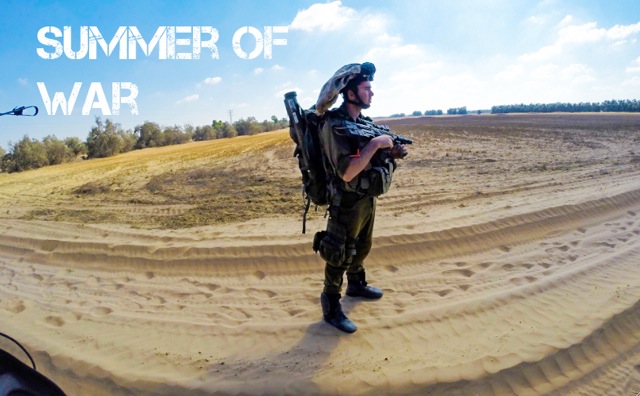SUMMER OF WAR
In Israel, alumni fought in Gaza while students dodged missiles, their parents worried and everybody prayed.
September 18, 2014
It wasn’t exactly summer vacation this year for members of the Shalhevet community, both inside and outside of Israel.
From juniors on their long-awaited Israel summer programs to alumni serving in the Israel Defense Forces – and everyone else, it seemed – June and July were spent chained to iPhone news apps, following the latest reports of rockets and troop mobilizations and arguments in cyberspace over who was to blame.
Operation Protective Edge, the IDF’s 50-day response to rocket attacks and tunnel incursions fromGaza, was the story of the summer of 2014. More than 30 Shalhevet students spent all or part of the summer in Israel, and almost all of them heard the sirens of incoming missiles fired by Hamas.
Junior Dorelle Nahmany spent the summer visiting family in Tel Aviv.
“We weren’t going to not go to Tel Aviv,” said Dorelle. “The rockets didn’t keep us away, but we just had to run to a shelter two to three times a day.”
The summer Israel component of the Diller Teen Leadership program, which would have hosted seniors Adam Kaufler and Goldie Fields, was cancelled, partly because the Israeli families who normally host the group were busy with the war.
“We canceled the trip to Israel based out of security concerns raised by the State Department and in consideration for our Tel Aviv partners,” said Sami Stein, the Diller Program coordinator, whose office coincidentally is in the Westside JCC.
“Being guests in their homes in particular, we felt it was not an appropriate time,” Ms. Stein said.
Still, the most affected members of the Shalhevet community were alumni and former students serving in the IDF in Gaza, along with their immediate family members right here in Los Angeles.
“It’s a strange feeling,” reflected sophomore Ben Harel, whose older brother Guy ’08 served in Gaza in an armored infantry division. “At the same time, we are really proud of him, and also really scared for him.”
Junior Derek Orenshein had a similar experience. His brother Kevin, who spent his freshman and sophomore years at Shalhevet before transferring to Hamilton, is a first sergeant in the Special Forces unit of the Givati Brigade.
“We were all proud of what he is doing, but we’re always waiting for the next cease-fire so he can tell us he’s okay,” said Derek in an interview.
Within the Shalhevet and broader Los Angeles Jewish community, everyone seemed to know and be praying for someone in Gaza.
“It’s a strange thing when you think about it, but I follow events in Israel more closely than I follow events in America and California.” said Rabbi Ari Schwarzberg, who had no relatives fighting in the war. “But especially this past summer, the events in Israel really put into focus the Jewish plight across the globe and the events felt extremely close to home.”
Both Kevin and Guy agreed to be interviewed when the war was over.
Kevin had experienced at least one very close call. At the start of the penultimate ceasefire, a unit he’d been with until the previous day discovered a tunnel near the Rafah crossing between Gaza and Egypt. As they entered, a terrorist blew himself up and killed three of Kevin’s friends: Major Benaya Sarel, 1st Sgt. Liel Gidoni, and Lt Hadar Goldin, who at first was thought to have been kidnapped.
“They set up an ambush,” Kevin said in a telephone interview from Israel last week. “The terrorist came out and my friend Liel shot him, but he still blew himself up. If we had been there, it would have been us.“
For six months before the war, his unit had been guarding the Gaza border. Tensions were running high.
“You’re protecting the cites that are along the border, protecting the border fence and making sure no terrorists jump in and out of tunnels placing bombs and all that stuff,” Kevin said.
He said they were aware of the tunnels and were trying to destroy them.
“They’re very well hidden, they were very deep,” Kevin said. “We would send these drilling machines along the border fence, they would drill 50 meters down and then move on. Drill a hole, move a meter, drill a hole — one time a terrorist shot the hydraulic system out with a rifle.”
He cannot say exactly what he did during the war, but he did say his unit was involved in destroying houses with explosives to seal off tunnels without having to call in airstrikes.
“We would detonate our explosives in a specific way so the stronghold would collapse on itself, instead of exploding and wounding other soldiers in the area,” Kevin said.
“That way the Air Force isn’t going to send a massive bomb. That would be serious overkill as opposed to us… and this way no one in the surrounding area will get hit.”
Guy Harel served in an armored division in Gaza for more than two weeks of the war.
A former tank commander, Guy was transferred to a new infantry armored corps division just before the war started. He served in the infantry – literally with his boots on the ground.
In Gaza, Guy would be stationed outside of a recently evacuated town or city, and he would use binoculars or thermal lenses to try to find terrorists still in the city. Once he found them, often shooting rockets or preparing to come out and fight the IDF, he would radio their position, and the Air Force or another military unit would take them out.
Guy graduated from Shalhevet in 2008, and attended San Diego State University, earning a degree in International Security and Conflict Resolution with a minor in Islamic and Arabic Studies. After graduating, he made aliyah and joined the IDF.
“Ever since I was 12, my parents told me I was going to serve in the IDF,” said Guy, whose mother is Israeli-American.
“But it really kicked in at Shalhevet and on the Poland-Israel trip,” he continued. “That was when I knew I wanted to make aliyah, and to me, in order to make aliyah, you have to serve in the army.”
After graduating from SDSU, Guy moved to Israel as part of the Garin Tzabar program, which acts as a kind of family for lone soldiers, and which gave him a home on a kibbutz called Nir Yitzhak. As a “lone soldier” – one whose parents live abroad — he was granted a one-month leave to come home when the conflict ended.
“I was looking for something to do every day, not just fill time,” he said of his decision to move and to serve.
He had no way of knowing there would be a war during the summer but he is both proud and grateful.
“When I have grandchildren, I want to be able to look them in the eyes and tell them that I did my part to defend the Jewish state,” said Guy between sips of a latte at the Starbucks on Fairfax and San Vicente.
Operation Protective Edge, which had killed roughly 2,000 Gazans and 70 Israelis as of Sept. 4, leveled much of Gaza, turned most of Israel into an anxious war zone until the indefinite ceasefire declared on August 26.
Those who experienced it will likely remember it for the rest of their lives.
This story, together with its related coverage, won 2nd Place, Boris Smolar Award for Excellence in Enterprise and Investigative Reporting of the 2015 Simon J. Rockower Awards, sponsored by the American Jewish Press Association.
SUMMER OF WAR: For Arab teens, a similar summer but with more death

OPINION: Marwa Abdelghani is a sophomore at UC Irvine and opposes the actions of both Israel and Hamas.
For members of the Muslim community in Los Angeles, the summer was filled with no less worry, and much more grieving. Muslim teens who’ve met with Shalhevet students in the past all knew people who had friends or relatives in Gazawho had been killed.
Mona Ghannoum, a recent graduate of Arcadia High School who coauthored an article with Boiling Point editors last summer, knew four families who had lost relatives in the conflict.
She and many of her friends from the Islamic Center of Southern California spent the summer following the news just as the Shalhevet community did.
“I keep updated on Twitter, Tumblr and Facebook,” said Mona, who is of Syrian and Egyptian descent and lives in Pasadena, “and I have updates set on my phone from various news sites.”
Asked whether she knew anyone who had lost relatives, she sent a note from an acquaintance named Ola Hamid, who lost four family members during the conflict.
“My brother-in-law and his three children were on the way to the hospital for the youngest child when a bomb exploded,” Hala wrote to the Boiling Point. “They died instantly.”
Another co-author of the summer opinion article was Marwa Abdelghani, 19, a student at UC Irvine who is also a fellow for MPAC, the Muslim Public Affairs Committee. Marwa herself lost a cousin in the West Bank earlier this year, and described the loss experienced by another family in Gaza.
“The El-Farra family, a very prominent family in the LA Muslim community, lost 10 family members in a house bombing in Gaza,” Marwa wrote in one of several e-mails replies to Boiling Point questions.
Johaina Shalabi, a Palestinian American and friend of Mona’s from Arcadia High, is now a freshman at the University of LaVerne. Her family is Gazan and she spent much of the summer worrying about family in the war zone.
“Gaza gave us all heart attacks and I was sick to my stomach with worry every day,” Johaina wrote in an e-mail to the Boiling Point. “It’s so hard.”
“It’s horrible as a Palestinian,” Johaina continued. “We had to worry about our family living there the entire time. My family and I have nothing against Jewish people at all, but whenever I visit, it’s just absolutely terrible with the checkpoints and whatnot.”
In addition to Israeli airstrikes and other military actions, Gazans had to cope with errant rockets fired by Hamas which landed in civilian areas, and with the lack of shelters or other infrastructure for protection from the war.
The Boiling Point asked Mona and Marwa who they blamed for the suffering this summer.
“I do not support Hamas nor do I support Israel and any of their actions,” Marwa said in an e-mail Sept. 5. “Both are committing terrorist acts.”
Mona replied a few hours later on the same thread.
“My opinion falls in line with Marwa,” she wrote.
SUMMER OF WAR: Hollywood, too, was divided

CONFLICT: Actor Seth Rogen, left, signed a published advertisement in support of Israel, but Shalhevet parent Fred Toczek said more than 100 others said no. NBA star Dwight Howard, right, tweeted #freepalestine but later apologized.
Just as the war in Gaza had a polarizing effect on the world at large, so did it divide Hollywood. While some celebritiestweeted solidarity with the plight of Palestinians, others advocated for Israel’s right to defend itself in the face of Hamas’ terrorist attacks.
Support for both sides in the 50-day war came from a broad array of artists, writers, executives and even athletes and took the form of statements, tweets, Facebook and Instagram postings and newspaper ads.
“If you’re anti-Israel then you’re anti-America,” said radio and television host Howard Stern, over satellite SiriusXM Radio. “It’s the only democracy over there, it’s the only friend we have who’s willing to fight and stand up for what’s right.”
Comedian Russell Brand, on the other hand, called for six companies to divest holdings in companies involved in Israeli military operations. Singer Rihanna, actor Mark Ruffalo and NBA basketball player Dwight Howard tweeted #freepalestine.
Although Howard, who plays for the Houston Rockets, retracted his post within minutes — tweeting “previous tweet was a mistake” — his former teammate, Israeli-born player Omri Casspi, responded.
“600 missiles been fired from GAZA by Hamas in the last 4 days. NUMBERS DONT LIE. STOP LYING,” tweeted Casspi.
Perhaps the most widely circulated argument in public started with Selena Gomez, whose Instagram posting “It’s about humanity, pray for Palestine” had 281,858 comments – for and against – as of Sept. 3.
Junior Dorelle Nahmany was among those who replied, posting “Pray for Israel.” She was cyberbullied by strangers as a result.
“They tagged me and commented on my pictures and said ‘You’re ugly’ – on my baby picture, which is kind of rude – and ‘[obscenity] you,’” Dorelle told The Boiling Point.
Another posting on Dorelle’s Instagram said: “You’re disgusting, [obscenity] idiots, wake up, that’s what the media’s trying to feed you. Hamas is not using babies as shields, your baby-killing Israel are. It’s not about religion, it’s about humanity – obviously something all of you [obscenities] lack.”
Married actors Javier Bardem and Penelope Cruz signed a petition condemning the loss of Palestinian civilians and declaring Israel’s conduct to be “genocide.” Ms. Cruz subsequently qualified her position, explaining that she was not versed in the politics of the region.
“You have forgotten how this war started,” said actor Jon Voight in a letter decrying Bardem and Cruz. “Did Hamas not kidnap and kill three young teenagers for the sake of killing, and celebrated after the killing? What a travesty of justice.”
The comedian Bill Maher also reacted, on his television show, Real Time with Bill Maher, on HBO.
“If the situation were reversed, Hamas would kill every single person in Israel,” Mr. Maher said. “The reason why that is not happening is because they can’t.”
Eventually, however, the Hollywood community took organized action.
A small group led by entertainment attorneys Patti Felker and Fred Toczek, working with a pro-Israel group called Creative Community for Peace, invited hundreds in the television and film industry to sign a statement denouncing Hamas.
The 179-word statement was published Aug. 25 in the New York Times, Los Angeles Times, Hollywood Reporter, Variety, and Billboard along with various websites.
“Hospitals are for healing, not for hiding weapons,” the ad read in part. “Schools are for learning, not for launching missiles. Children are our hope, not our human shields.”
Just under 200 people signed it, Arnold Schwarzenegger, Sylvester Stallone, and Seth Rogan being among the first, according to Mr. Toczek, who is the father of junior Jacob Toczek.
“Actors, and agents, and managers and studio executives have a loud voice,” Mr. Toczek said in an interview. “When they do this ad it brings a lot of attention to the issue. I think it was also important to make a statement and to encourage people within the entertainment industry to proactively speak out in support of Israel.”
About 150 never responded to the request to participate, he said. Mr. Toczek declined to share any of their names.
“There were definitely a surprising number of people that were unwilling to sign it … due to fear of a backlash when you support Israel,” Mr. Toczek said.
He said some signatories suffered a backlash on their social media accounts after the ad came out.
Signer Jeff Astrof, executive producer of television shows including Ground Floor, has not received any industry backlash, but he told the Boiling Point that he found it unusual that after posting a video of himself completing the ALS challenge, he received over 150 “likes,” but when posting the pro-Israel letter, he collected only 14.
Michael Borkow, a writer for Friends, Malcolm in the Middle, and Roseanne, among other shows, speculated regarding the cause of anti-Israel sentiment within Hollywood.
“The problem here is often, I think, ignorance, and not anti-Semitism,” said Mr. Borkow in an interview.
Though Mr. Borkow immediately signed the Creative Community’s ad, he said he understood why the plight of Gazans had aroused sympathy.
“If anybody on any side of this is untouched by the death of a child, he has a serious problem, even the most ardent Zionist,” Mr. Borkow said in an interview.
The producer and philanthropist Haim Saban said that was part of what the ad sought to explain.
“It is important to understand that Hamas has committed acts of terror not only against Israel, but also against innocent Palestinians,” said Mr. Saban in an e-mail response to Boiling Point questions.
How polarizing the summer’s conflict will be in the long run remained an open question, in Hollywood as in Shalhevet. Dorelle said she “hated” the people who attacked her on Instagram and deleted all their comments.
“It was standing up for Israel,” Dorelle said of her response to Selena Gomez. “I’m not gonna be afraid of them.”
Sigal Spitzer, chair of Firehawks for Israel, said that in the foreseeable future, she would not look at anti-Israel posters the same way again.
“When I hear people in positions of power such as Dwight Howard say anti-Israel and anti-Semetic remarks, it definitely alters my perspective on these people,” said Sigal.
“It’s not because I don’t think that the Palestinians have a narrative, or that what happened in the war is not a humanitarian crisis,” she said, “but rather because I feel so passionate about supporting Israel — especially in regard to public opinion.”
Related: Summer of War: Jewish law, though sparse, leans toward self-defense
Related: A view from Israel: Who am I, who are we?
Related: In Israel’s north, staying safe means staying home for 250 underprivileged children
Related: A view from Israel, Part 2: Safety guilt
Related: A view from Israel, Part 3: Surreality
